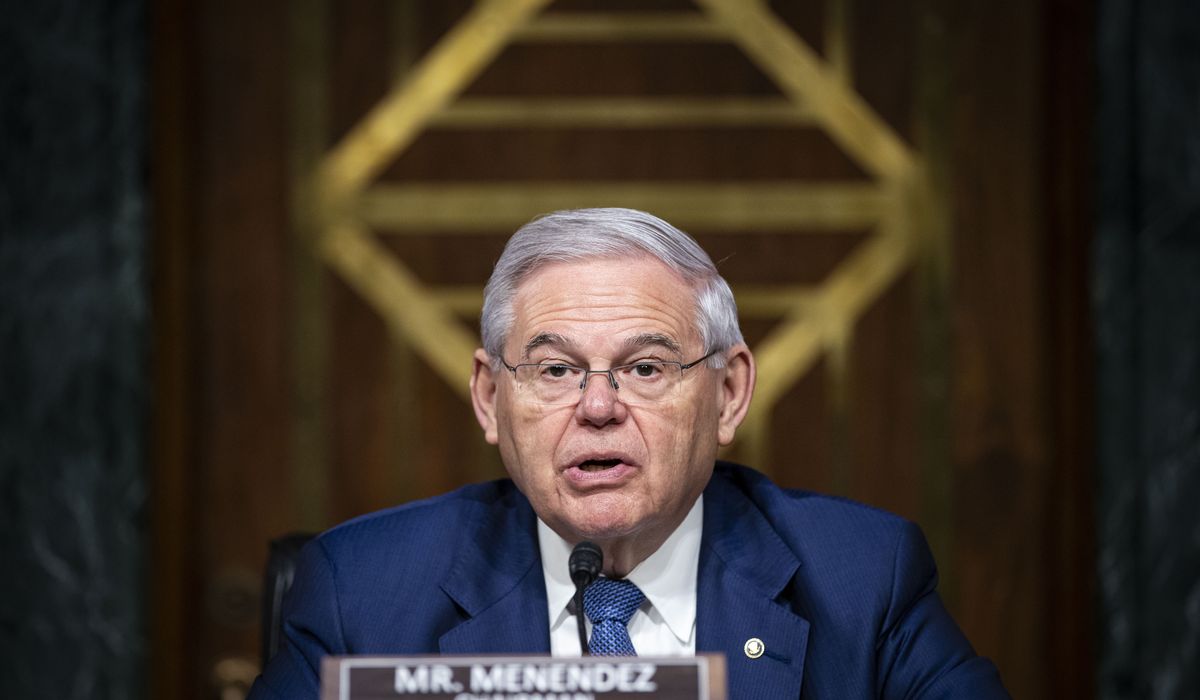

Senate Foreign Relations Committee Chairman Robert Menendez has not shied away from public disagreements over the diplomatic moves by President Biden.
Mr. Menendez was one of the most prominent Democrats to directly criticize the chaotic U.S. withdrawal from Afghanistan and has been a constant thorn in Mr. Biden’s side over his long-stalled attempts to restore the Obama-era nuclear deal with Tehran.
As fresh clashes emerge, Mr. Menendez made it clear that he won’t take a back seat on foreign policy to Mr. Biden, who prides himself on being a foreign policy hotshot and, when he was a senator, also chaired the Foreign Relations Committee.
In recent weeks, Mr. Biden’s sweeping changes to U.S. policy toward Cuba and Venezuela were met with swift, stinging rebukes from the New Jersey Democrat.
On Biden’s decision to reverse Trump-era pressure on Cuba, Mr. Menendez expressed “dismay” over key travel provisions included in the new policy, adding that the changes reflected a “state of denial.”
The new policy reinstated certain travel categories including group “people-to-people” and educational travel to Cuba, which became authorized under President Obama, before many travel categories again became restricted under the Trump administration. The new Biden rules also authorize scheduled charter flights to locations beyond Havana and will also allow travel for professional meetings and research.
Under Mr. Biden, the U.S. will lift a $1,000 per-quarter limit on remittances sent from Cuban nationals in the U.S. to their family members in Cuba and will allow non-family remittances, which the administration says will support Cuban entrepreneurs.
Mr. Menendez said that easing the pressure on Cuba “risks sending the wrong message to the wrong people, at the wrong time.”
“For over sixty years, the tides of romanticism toward Cuba have come and gone, but they’ve always crashed hard against the rocks of reality,” Mr. Menendez said. “Today is another reminder that we must ground our policy in that reality, reaffirm our nation’s indiscriminate commitment to fight for democracy from Kyiv to Havana, and make clear we will measure our success in freedom and human rights and not money and commerce.”
Even more scathing were Mr. Menendez’s remarks the following day after administration officials told reporters that Mr. Biden was nearing a decision to loosen sanctions against Venezuela, in a move largely seen as a sign of goodwill in the hopes of resuming negotiations between Venezuelan Nicolas Maduro and U.S.-backed opposition leaders in the country.
The rollback of sanctions would allow Chevron Corp. to negotiate its license with Venezuela’s state-owned oil company, PDVSA, and remove a former senior PDVSA official from the U.S. sanctions list.
Mr. Menendez fired off a scathing rebuke, saying Biden’s strategy was “destined to fail.”
“From Tehran to Havana to Pyongyang, history shows us negotiations based on unilateral concessions have a failed track record of producing actual changes to the behavior of authoritarian regimes,” he said.
He also pledged to pressure the Biden administration “to ensure U.S. policy for dealing with murderous tyrants does not betray our values to reward bad behavior.”
Mr. Menendez’s tug of war with the administration came to a head during a recent hearing on the administration’s progress in reentering the 2015 nuclear deal with Iran.
The administration has been mired in months of stalled negotiations with Tehran over restoring the 2015 deal, formally known as the Joint Comprehensive Plan of Action, meant to shorten Iran’s strides toward nuclear armament.
President Trump withdrew from the agreement in 2018 and reimposed sanctions that had been lifted as part of the Obama-era accord.
Tehran has demanded that the administration remove sanctions as stipulated in the original deal in exchange for curbing its nuclear program, in addition to delisting Iran’s Islamic Revolutionary Guard Corps from the U.S. foreign terrorism list, with the latter remaining a key sticking point with the administration.
Lawmakers on both sides of the aisle eye the administration’s attempts to restore the deal with skepticism, and have openly criticized the White House for keeping details of on-again, off-again negotiations with Tehran too close to the vest.
Mr. Menendez demanded Biden officials appear before his committee before the Senate adjourned for its two-week Labor Day recess to provide lawmakers with an update on the talks and an overview administration’s fallback should the talks ultimately fall through.
The State Department sent its lead negotiator, Special Envoy for Iran Robert Malley, to brief the lawmakers.
At the hearing, Mr. Mendendez reprimanded the administration for miscalculating, in his view, Iran’s posture, and specifically misjudging the extent to which Iranian negotiators would be willing to return to the 2015 deal on terms that could be acceptable to the U.S.
“Iran has dragged out this process, driving up its demands and exerting its leverage, convincing the world that the United States wants [the nuclear deal] more than the Iranian regime does,” he said.
Mr. Malley conceded that the chances of restoring the nuclear deal have become increasingly slim, and he assured the lawmakers that the administration was ready to walk away from negotiations “if Iran maintains demands that go beyond the scope” of the Obama-era accord.
Mr. Malley also testified that the administration has “no illusion” about the threat posed by Iran. “Nuclear or no nuclear deal,” he said, “this Iranian government will remain a threat.”
Mr. Menendez said the time has come for the administration to focus on a strategy for dealing with an Iran that may become more dangerous as it approaches nuclear weapons capability.
“We need to tackle what comes next, and we need to hear your plan,” he told Mr. Malley.
“But if that plan includes the possibility of a deal with Iran, I want to make clear that it must be subject to congressional review,” Mr. Menendez said. “Congress has and will continue to play an important role with respect to Iran policy, and I would expect the administration to follow the law.”
